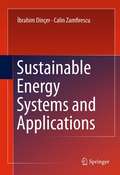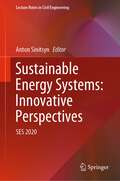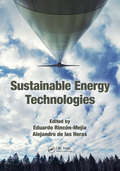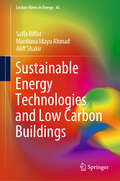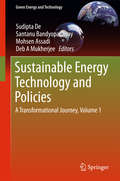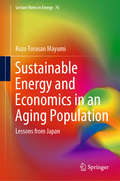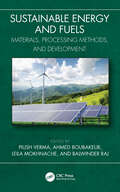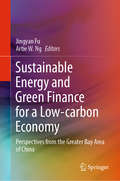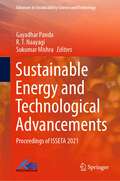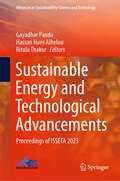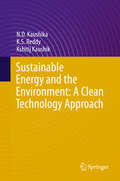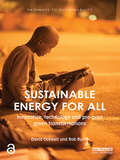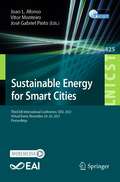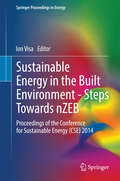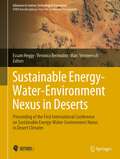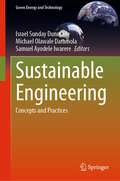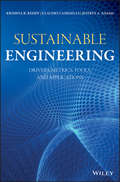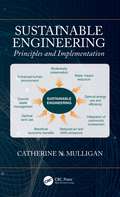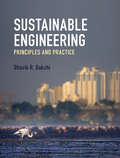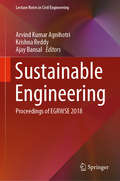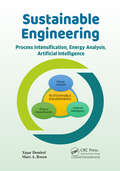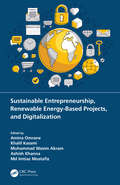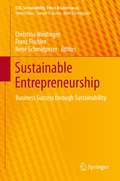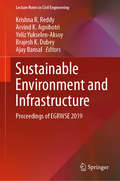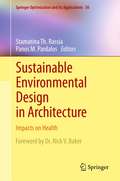- Table View
- List View
Sustainable Energy Systems and Applications
by Calin Zamfirescu Ibrahim DincerThe concept of sustainable development was first introduced by the Brundtland Commission almost 20 years ago and has received increased attention during the past decade. It is now an essential part of any energy activities. This is a research-based textbook which can be used by senior undergraduate students, graduate students, engineers, practitioners, scientists, researchers in the area of sustainable energy systems and aimed to address some key pillars: better efficiency, better cost effectiveness, better use of energy resources, better environment, better energy security, and better sustainable development. It also includes some cutting-edge topics, such hydrogen and fuel cells, renewable, clean combustion technologies, CO2 abatement technologies, and some potential tools (exergy, constructal theory, etc.) for design, analysis and performance improvement.
Sustainable Energy Systems: SES 2020 (Lecture Notes in Civil Engineering #141)
by Anton SinitsynThis book gathers the latest advances, innovations, and applications in the field of sustainable energy systems, as presented by researchers and engineers at the International Conference Sustainable Energy Systems: Innovative Perspectives (SES), held in Saint-Petersburg, Russia, on October 29-30, 2020. It covers highly diverse topics, including applications of renewable energy sources, recycling of solid municipal and industrial waste, circular economy based on agricultural waste, energy-efficient and sustainable buildings, innovation management and technologies of sustainable cities, sustainable construction, creative construction technology and materials, construction simulation and virtual construction, BIM and rapid prototyping for construction, consumption practices in the digital era, sustainable operations management, and supply chain management in the digital era. The contributions, which were selected by means of a rigorous international peer-review process, highlight numerous exciting ideas that will spur novel research directions and foster multidisciplinary collaborations.
Sustainable Energy Technologies
by Eduardo Rincón-Mejía Alejandro de las HerasThis book examines the key aspects that will define future sustainable energy systems: energy supply, energy storage, security and limited environmental impacts. It clearly explains the need for an integrated engineering approach to sustainable energies, based on mathematical, biogeophysical, and engineering arguments. Resilient and efficient alternatives are compared to non-sustainable options. This book results from the collaboration of 50 international contributors.
Sustainable Energy Technologies and Low Carbon Buildings (Lecture Notes in Energy #45)
by Mardiana Idayu Ahmad Saffa Riffat Aliff ShakirThis book aims to offer an in-depth guide and fundamental comprehension of sustainable energy technologies and their essential function in decreasing energy consumption in buildings under diverse climatic conditions. It has been designed to stimulate additional research and innovation, especially in the field of green technology for building applications. This book embodies the culmination of extensive research and case studies, encompassing the initial developments to the latest advancements in sustainable energy systems, particularly emphasising energy-efficient building technologies. It also highlights up-to-date reviews and research into meeting low and zero carbon demand in buildings and includes extensive coverage of established and emerging sustainable energy technologies for building applications, addressing their physical principles, mechanisms, applications, and cutting-edge technological advances. The coverage of book is divided into five main parts: Thermal energy-efficient systems; Sustainable power generation; Energy-efficient lighting technologies; Zero-energy and low carbon buildings and; Eco-cities as sustainable urban living. Taken together, they provide a concise explanation of low and zero carbon buildings’ role in tackling the world’s energy challenges, with an emphasis on design, conversion techniques, and materials and on the economic and environmental assessment of technology. Innovative concepts, design, and planning in connection with global urbanization and improving sustainable development are also discussed. In addition, the book features case studies on worldwide sustainable energy technologies, low and zero carbon buildings, and eco-cities as sustainable urban environments. This book offers a valuable source of information for developers, architects, building managers and owners, and engineers working in sustainable energy fields, as it provides in-depth information on a diverse range of technologies designed to achieve environmentally friendly solutions. The book also benefits students and academics, as it offers optimal supporting material for an introductory course in this field.
Sustainable Energy Technology and Policies: A Transformational Journey, Volume 1 (Green Energy And Technology)
by Sudipta De Santanu Bandyopadhyay Mohsen Assadi Deb A MukherjeeThis book presents an integrated approach to sustainably fulfilling energy requirements, considering various energy-usage sectors and applicable technologies in those sectors. It discusses smart cities, focusing on the design of urban transport systems and sources of energy for mobility. It also shares thoughts on individual consumption for ensuring the sustainability of energy resources and technologies for emission reductions for both mobility and stationary applications. For the latter, it examines case studies related to energy consumption in the manufacturing sector as well as domestic energy requirements. In addition it explores various distribution and policy aspects related to the power sector and sources of energy such as coal and biomass. This book will serve as a valuable resource for researchers, practitioners, and policymakers alike.
Sustainable Energy and Economics in an Aging Population: Lessons from Japan (Lecture Notes in Energy #76)
by Kozo Torasan MayumiThis book discusses current challenges in Japan, focusing on the nation’s rapidly aging population and low birth rate, along with persistent public bond issues with heavy interest payments, the potential collapse of social security systems, and income inequality, as well as the global picture. In turn, it examines the accessibility of global fossil fuels and feasibility of large-scale solar energy use. A new theory of money, interest, and capital is put forward, together with a proposal for an alternative system of international monetary cooperation, to promote a more sustainable and equitable world. Specific topics discussed include • the inverted population pyramid, due to the dramatic change in human life spans and declining birth rates; • the rapidly shrinking workforce, aging population, and declining GDP share sourced from industry; • disproportionate debt expansion due to public bond issues and coping with a persistent budget deficit; • the potential collapse of social security systems combined with income inequality; and • how to mitigate these bio-economic predicaments. Global Energy Sources offers an essential guide for policymakers, economists, researchers, and all those concerned with establishing a sustainable and equitable society from both energy and monetary perspectives. Further, it will be of interest to readers around the world, as the lessons learned from Japan are crucial to other developed societies that may eventually face the same types of challenge.
Sustainable Energy and Fuels: Materials, Processing Methods, and Development
by Piush Verma, Ahmed Boubakeur, Leila Mokhnache, and Balwinder RajSustainability refers to the concept that all people should be able to meet their basic needs indefinitely, without compromising future generations. Sustainability, in terms of energy, embraces the same principles. One day the world will run out of fossil fuels. We need to realize how important sustainable energy is and its significance when it comes to the future of our planet. Sustainable energy includes any energy source that cannot be depleted and can remain viable forever. It does not need to be renewed or replenished; sustainable energy meets our demand for energy without any risk of failing or running out. This is why sustainable energy is the answer to our energy needs. Furthermore, sustainable energy doesn’t harm the environment (or at most, there is a minimal risk), increase climate change, or cost a heavy price. Although there is a cost associated with creating and building ways to capture sustainable energy, the energy sources themselves are typically free. The main objective of this book is to provide an up-to-date review of conduction mechanisms, structure construction, operation, performance evaluation, and applications of various renewable energies and fuels. The current trend in innovation is likely to explore the potential to connect novel materials, design methods, and new techniques, which would allow us to maintain existing resources and develop new methods by employing smart technologies. This book provides a complete insight into recent advancements in nanomaterials, renewable energy design, and applications. The purpose of this book is to provide relevant theoretical frameworks that include materials, modeling, circuit design, and the latest developments in experimental work in the field of renewable energy and fuels.This book: Presents solar energy conversion including photovoltaics and artificial photosynthesis Discusses important topics such as energy management standards, biofuels, biorefining, and capacitive desalination Illustrates the importance of novel materials and process improvements for sustainable energy and fuels Includes research problem statements with specifications and commercially available industry data Covers catalysis for energy technologies, including the sustainable synthesis of fuels and chemicals, molecular, and bioinspired catalysis The text is primarily written for senior undergraduates and graduate students, and academic researchers in the fields of electrical engineering, electronics and communication engineering, environmental engineering, and renewable energy.
Sustainable Energy and Green Finance for a Low-carbon Economy: Perspectives from the Greater Bay Area of China (Green Energy And Technology Ser.)
by Jingyan Fu Artie W. NgThe book provides readers with essential insights into key issues in connection with planning, developing and financing sustainable energy projects in China that are relevant for practitioners, investors and developers involved in the emerging sustainable energy sector. It offers readers a deeper understanding of these contemporary issues by drawing on the lessons learned in real-world sustainable energy and green finance development activities in China, which are driven by central planning and policy implementation and complemented by investments and finances from public-private partnerships.
Sustainable Energy and Technological Advancements: Proceedings of ISSETA 2021 (Advances in Sustainability Science and Technology)
by Sukumar Mishra Gayadhar Panda R. T. NaayagiThis book contains selected papers presented at the First International Symposium on Sustainable Energy and Technological Advancements (ISSETA 2021), which was organized by the Department of Electrical Engineering, NIT Meghalaya, Shillong, India, during September 24–25, 2021. The topics covered in the book mainly focuses on the cutting-edge research domain with respect to sustainable energy technologies, smart building, integration, and application of multiple energy sources; advanced power converter topologies and their modulation techniques; and information and communication technologies for smart microgrids.
Sustainable Energy and Technological Advancements: Proceedings of ISSETA 2023 (Advances in Sustainability Science and Technology)
by Hassan Haes Alhelou Gayadhar Panda Ritula ThakurThis book contains selected papers presented at Second International Symposium on Sustainable Energy and Technological Advancements (ISSETA 2023), organized by the Department of Electrical Engineering, NIT Meghalaya, Shillong, India, during February 24–25, 2023. The topics covered in the book are the cutting-edge research involved in sustainable energy technologies, smart building technology, integration and application of multiple energy sources; advanced power converter topologies and their modulation techniques; and information and communication technologies for smart micro-grids.
Sustainable Energy and the Environment: A Clean Technology Approach
by N. D. Kaushika K. S. Reddy Kshitij KaushikThis book emerges from the recognition that energy, environment and ecosystems are dynamically and inextricably connected. The energy environment system must be addressed in its totality, so that we can devise sustainable solutions that incorporate both economic growth and environmental conservation. No single clean energy source will sustain long-term energy security, and fossil fuels will remain prominent in the mix of energy sources for several decades to come. Energy solutions, therefore, must employ a broad and diverse range of approaches, including cleaner fossil fuel technologies, and an affordable transition to greener power generation employing waste, water and renewable resources. Moreover, adapting to this changing global energy picture will require a transformational shift in the ways we use and deliver energy services. The authors begin with a broad introductory chapter on sustainable energy and the environment, classifying energy resources, cataloging environmental degradations, and outlining the concepts and practices of sustainability. In Chapters Two and Three, they summarize the basic constituents of the environment, the biosphere and its natural cycles, and offer a model of Earth's planetary temperatures and the greenhouse effect. Chapters Four and Five outline conventional energy and power systems, and related environmental degradations. The next several chapters cover clean coal technologies for power generation, and discuss sustainable energy and power technologies based on both thermal and photovoltaic solar energy, along with biomass and wind. The final chapters examine in depth the management of waste and water, pollution control and energy conservation. The book introduces a unique approach to sustainability and energy conservation which emphasizes the relationships between underlying scientific principles and practical applications employed in engineering solutions. All this is offered in a form that matches the requirements of college-level environmental science and engineering courses.
Sustainable Energy for All: Innovation, technology and pro-poor green transformations (Pathways to Sustainability)
by David Ockwell Rob ByrneDespite decades of effort and billions of dollars spent, two thirds of people in sub-Saharan Africa still lack access to electricity, a vital pre-cursor to economic development and poverty reduction. Ambitious international policy commitments seek to address this, but scholarship has failed to keep pace with policy ambitions, lacking both the empirical basis and the theoretical perspective to inform such transformative policy aims. Sustainable Energy for All aims to fill this gap. Through detailed historical analysis of the Kenyan solar PV market the book demonstrates the value of a new theoretical perspective based on Socio-Technical Innovation System Building. Importantly, the book goes beyond a purely academic critique to detail exactly how a Socio-Technical Innovation System Building approach might be operationalized in practice, facilitating both a detailed plan for future comparative research as well as a clear agenda for policy and practice. These plans are based on a systemic perspective that is more fit for purpose to inform transformative policy ambitions like the UN’s Sustainable Energy for All by 2030 initiative and to underpin pro-poor pathways in sustainable energy access. This book will be of interest to academic researchers, policy makers and practitioners in the field of sustainable energy access and low carbon development more broadly.
Sustainable Energy for Smart Cities: Third EAI International Conference, SESC 2021, Virtual Event, November 24–26, 2021, Proceedings (Lecture Notes of the Institute for Computer Sciences, Social Informatics and Telecommunications Engineering #425)
by José Gabriel Pinto Vitor Monteiro Joao L. AfonsoThis book constitutes the refereed post-conference proceedings of the 3rd EAI International Conference on Sustainable Energy for Smart Cities, SESC 2021, held in November 2021. The conference was framed within the 7th Annual Smart City 360° Summit. Due to COVID-19 pandemic the conferences were held virtually. The 13 revised full papers were carefully reviewed and selected from 28 submissions. They present multidisciplinary scientific results toward answering the complex technological problems of emergent Smart Cities. The subjects related to sustainable energy, framed with the scope of smart cities and addressed along with the SESC 2021 conference, are crucial to guarantee an equilibrium among economic growth and environmental sustainability, as well as to contribute to reducing the impact of climate change.
Sustainable Energy in the Built Environment - Steps Towards nZEB
by Ion VisaThis book addresses the main challenges faced today in implementing the Nearly Zero Energy Buildings (nZEB) concept. The book starts with a chapter that addresses problems related to the energy demand and renewable energy sources available in the built environment, along with the restrictions and opportunities in developing sustainable, efficient and affordable solutions, also gaining aesthetic and architectural acceptance. Advanced solutions to cover the energy needs by using various renewable-based energy mixes are presented in two chapters. These two chapters discuss the problem of conversion efficiency at the level of components and systems, aiming at giving value to the variable renewable energy sources, in producing thermal and electric energy. The concept is discussed further in a chapter on advanced solutions for water re-use and recycling wastes as second raw materials. The need for new strategies and implementation tools, for education and training is addressed in the final chapter as part of the nZEB concept, towards sustainable communities. The sub-chapters of the book were openly presented during the 4th Edition of the Conference for Sustainable Energy, held 6-8 November, 2014 and organized by the R&D Centre Renewable Energy Systems and Recycling at the Transilvania University of Brasov, Romania. This event was developed under the patronage of the International Federation for the Promotion of Mechanism and Machine Science (IFToMM), through the Technical Committee Sustainable Energy Systems.
Sustainable Energy-Water-Environment Nexus in Deserts: Proceeding of the First International Conference on Sustainable Energy-Water-Environment Nexus in Desert Climates (Advances in Science, Technology & Innovation)
by Essam Heggy Veronica Bermudez Marc VermeerschThis book addresses challenges and opportunities in the Energy-Water-Environment (EWE) nexus, with a particular focus on research and technology development requirements in harsh desert climates. Its chapters include selected contributions presented during the 1st international conference on sustainable Energy-Water-Environment nexus in desert climates (ICSEWEN-19) held at the Qatar Environment and Energy Research Institute (QEERI) in Doha, Qatar in December 2019. This volume is comprised of three main chapters, each describing important case studies and progress on water, energy and environmental questions. A fourth chapter on policies and community outreach on these three areas is also included. This compilation aims to bridge the gap between research and industry to address the socioeconomic impacts of the nexus imbalance as perceived by scientists, industrial partners, and policymakers. The content of this book is of particular importance to graduate students, researchers and decision makers interested in understanding water, energy and environmental challenges in arid areas. Re searchers in environmental and civil engineering, chemistry, hydrology and environmental science can also find unique in-situ observations of the current nexus imbalance in deserts climate to validate their investigations. It is also an invaluable guide for industry professionals working in water, energy, environment and food sectors to understand the rapidly evolving landscape of the EWE nexus in arid areas. The analyses, observations and lessons-learned summarized herein are applicable to other arid areas outside North Africa and the Arabian Peninsula as well, such as central Australia, the southwest of the United States and deserts in central Asia.
Sustainable Engineering: Concepts and Practices (Green Energy and Technology)
by Israel Sunday Dunmade Michael Olawale Daramola Samuel Ayodele IwarereSustainable Engineering: Concepts and Practices provides insights into current perspectives on sustainable engineering research. It highlights the drivers, motivations, and challenges affecting the development and adoption of sustainable engineering in various sectors of the economy and how they impact sustainable development. Contributions from researchers representing multiple branches of engineering in academia, government laboratories, and industry present alternative approaches to traditional engineering practices. These approaches effect change, making the design, construction, production, and management of products, processes, and systems more environmentally friendly, socially beneficial, and economically profitable. The book will be a trusted reference for graduate students, practicing engineers, and other professionals interested in developing or using sustainable products and systems.
Sustainable Engineering: Drivers, Metrics, Tools, and Applications
by Krishna R. Reddy Claudio Cameselle Jeffrey A. AdamsComprehensively covers the definition, methodology, and current applications of the principles of sustainability and resiliency in every engineering discipline This book contains detailed information about sustainability and resiliency principles and applications in engineering practice, and provides information on how to use scientific tools for sustainability assessment that help engineers select the best alternative for each project or activity. Logically organized around the three pillars of sustainability—environment, economy, and society—it is a primary resource for students and professionals alike. Sustainable Engineering: Drivers, Metrics, Tools, and Applications offers numerous ways to help engineers contribute towards global sustainable development while solving some of the grand challenges the world is facing today. The first part of the book covers the environmental, economic, and social impacts associated with project/product development as well as society as a whole. This is followed by a section devoted to sustainability metrics and assessment tools, which includes material flow analysis and material budget, carbon footprint analysis, life cycle assessment, environmental health risk assessment, and more. Next comes an in-depth examination of sustainable engineering practices, including sustainable energy engineering, sustainable waste management, and green and sustainable buildings. The book concludes with a look at how sustainable engineering may be applied to different engineering (i.e. environmental, chemical, civil, materials, infrastructure) projects. Some of the key features of this book include the following: Provides a complete and sensible understanding of the important concepts of sustainability, resiliency, and sustainable engineering Offers detailed explanations of sustainable engineering practices in waste management and remediation of contaminated sites, civil construction and infrastructure, and climate geoengineering Presents a set of case studies across different engineering disciplines such as bio/chemical, environmental, materials, construction, and infrastructure engineering that demonstrate the practical applicability of sustainability assessment tools to diverse projects Includes questions at the end of each chapter as well as a solutions manual for academic adopters The depth of coverage found in Sustainable Engineering: Drivers, Metrics, Tools, and Applications makes it an ideal textbook for graduate students across all engineering disciplines and a handy resource for active professionals.
Sustainable Engineering: Principles and Implementation
by Catherine MulliganSustainable Engineering: Principles and Implementation provides a comprehensive overview of the interdisciplinary field of sustainability as it applies to engineering and methods for implementation of sustainable practices. Due to increasing constraints on resources and on the environment and effects of climate change, engineers are being faced with new challenges. While it is generally believed that the concepts of sustainable design must be adhered to so that future generations may be protected, the execution and practice of these concepts are very difficult. It is therefore the focus of this book to give both a conceptual understanding as well as practical skills to apply sustainable engineering principles to engineering design. This book introduces relevant theory, principles, and ethical expectations for engineers, presents concepts related to industrial ecology, green engineering, and eco-design, and details frameworks that indicate the challenges and constraints of applying sustainable development principles. It describes the tools, protocols, and guidelines that are currently available through case studies and examples from around the world. The book is designed to be used by undergraduate and graduate students in any engineering program (with particular emphasis on civil, environmental and chemical engineering) and other programs in which sustainability is taught, in addition to practicing scientists and engineers and all others concerned with the sustainability of products, projects and processes. Specific Features: Discusses sources of contaminants and their impact on the environment Addresses sustainable assessment techniques, policies, protocols and guidelines Describes new tools and technologies for achieving sustainable engineering Includes social and economic sustainability dimensions Offers case studies demonstrating implementation of sustainable engineering practices
Sustainable Engineering: Principles and Practice
by Bhavik R. BakshiDrawing on multidisciplinary perspectives from engineering, economics, business, science, and human behavior, this text presents an unrivalled introduction to how engineering practice can contribute to sustainable development. Varied approaches for assessing the sustainability of engineering and other human activities are presented in detail, and potential solutions to meet key challenges are proposed, with an emphasis on those that require engineering skills. Each concept and approach is supported by mathematical representation, solved problems, real-world examples, and self-study exercises. Topics covered range from introductory material on the nature of sustainability, to more advanced approaches for assessment and design. Prerequisites for each chapter are clearly explained so the text can be adapted to meet the needs of students from a range of backgrounds. Software tutorials, project statements and solutions, lecture slides, and a solutions manual accompany the book online, making this an invaluable resource for courses in sustainable engineering, as well as a useful reference for industry practitioners.
Sustainable Engineering: Proceedings of EGRWSE 2018 (Lecture Notes in Civil Engineering #30)
by Arvind Kumar Agnihotri Ajay Bansal Krishna ReddyThis volume contains selected papers presented during the International Conference on Environmental Geotechnology, Recycled Waste Material and Sustainable Engineering (EGRWSE-2018). The multidisciplinary articles in this volume discuss environment-friendly technologies and the application of 'smart' solutions and initiatives to improve infrastructure and services, with a strong emphasis on sustainability and conservation of resources. This volume will be of interest to engineers, professionals, and researchers working on improving urban infrastructure and strengthen civic amenities in a sustainable manner.
Sustainable Engineering: Process Intensification, Energy Analysis, and Artificial Intelligence
by Marc A. Rosen Yasar DemirelSustainable engineering is of great importance for resilient and agile technology and society. This book balances economics, environment, and societal elements of sustainable engineering by integrating process intensification, energy analysis, and artificial intelligence to reduce production costs, improve the use of material and energy, product quality, safety, societal well-being, and water usage. The book provides comprehensive discussion of topics on process intensification, energy analysis, and artificial intelligence that include optimization, energy integration, green engineering, pinch analysis, exergy analysis, feasibility analysis, life cycle assessment, circular economy, bioeconomy, data processing, machine learning, expert systems, digital twins, and self-optimized plants for sustainable engineering.
Sustainable Entrepreneurship, Renewable Energy-Based Projects, and Digitalization
by Ashish Khanna Amina Omrane Khalil Kassmi Muhammad Wasim Akram Md Imtiaz MostafizSustainable Entrepreneurship is nowadays considered as a discipline at the cross-roads of many others. This book describes recent cases, techniques and tools proposed for leaders, entrepreneurs, and practitioners who are involved and responsible for making strategic decisions in their companies and aiming at sustainable development. This book highlights the use of new business models/methods that can be employed by organizations and researchers to save millions of dollars, to enhance the economic growth, as well as to resolve environmental and social issues, via sustainable networks, renewal energy distribution, and social/green entrepreneurship. It will provide a comprehensive discussion of practical techniques, like Machine Learning, Robotics, Photovoltaic solar energy, in the field of renewable energy, and other digital tools, such as digital marketing, crowdsourcing platforms, and digital currency. Meanwhile, it will enlighten the way for entrepreneurs and decision makers by helping them to learn how to grow their business. The focus will be on how to benefit from these techniques to develop sustainable and renewable energy-based projects, as well as digitalized new ventures. The book walks the reader through the latest emerging trends in digitalization that can support practitioners, managers, entrepreneurs, and researchers to help them appreciate the application of sustainable solutions in various functional domains.
Sustainable Entrepreneurship: Business Success through Sustainability
by René Schmidpeter Franz Fischler Christina WeidingerSustainable Entrepreneurship stands for a business driven concept of sustainability which focusses on increasing both social as well as business value - so called Shared Value. This book shows why and how this unique concept has the potential to become the most recognised strategic management approach in our times. It aims to point out the opportunities that arise from putting sustainable entrepreneurship into practice. At the same time, this book is a wake-up call for all those companies and decision makers who underestimated Sustainable Entrepreneurship before or who are simply not aware of its greater dimension. Well structured chapters from different academic and business perspectives clearly outline how Sustainable Entrepreneurship contributes to solving the world's most challenging problems, such as Climate Change, Finance Crisis and Political Uncertainty, as well as to ensuring business success. The book provides a framework of orientation where the journey might go: What can a successful concept of SE look like? What are the key drivers for its realisation? What is the role of business in shaping the future of our society? The book also presents best practices and provides unique learnings as well as business insights from the international Sustainable Entrepreneurship Award (www.se-award.org). The Sustainable Entrepreneurship Award (short SEA) is an award for companies today who are thinking about tomorrow by making sustainable business practices an integral part of their corporate culture. Companies that receive the SEA are being recognised for the vision they have shown in combining economic and sustainable responsibility.
Sustainable Environment and Infrastructure: Proceedings of EGRWSE 2019 (Lecture Notes in Civil Engineering #90)
by Krishna R. Reddy Ajay Bansal Arvind K. Agnihotri Yeliz Yukselen-Aksoy Brajesh K. DubeyThis volume contains selects papers presented during the 2nd International Conference on Environmental Geotechnology, Recycled Waste Materials and Sustainable Engineering, held in the University of Illinois at Chicago. It covers the recent innovations, trends, and concerns, practical challenges encountered, and the solutions adopted in waste management and engineering, geotechnical and geoenvironmental engineering, infrastructure engineering, and sustainable engineering. This book will be useful for academics, educators, policy makers and professionals working in the field of civil engineering, chemical engineering, environmental sciences and public policy.
Sustainable Environmental Design in Architecture: Impacts on Health (Springer Optimization and Its Applications #56)
by Panos M. Pardalos Stamatina Th. RassiaOver the last few decades, there have been dramatic improvements in the understanding and research of environmental design. Numerous methods have been developed to enhance architectural design in order for it to be more energy efficient, sustainable and health enhancing. This book presents several theories and techniques that can be used to improve how buildings are engineered and designed in order to utilize more sustainable construction methods while promoting the health of the building's occupants. Contributions to the study of environmental design have come from a diversity of fields including applied mathematics, optimization, computer science, medical research, psychology, management science, architecture, and engineering. The techniques developed in these areas of research can be used to increase building performance, occupant satisfaction, productivity, and well being, and reducing the incidence of health conditions and chronic diseases related to the use of a designed space. This book provides architectural practitioners, civil engineers as well as other interdisciplinary researchers with the techniques needed to design, implement, and test for sustainability and health promotion in new or existing structures.
